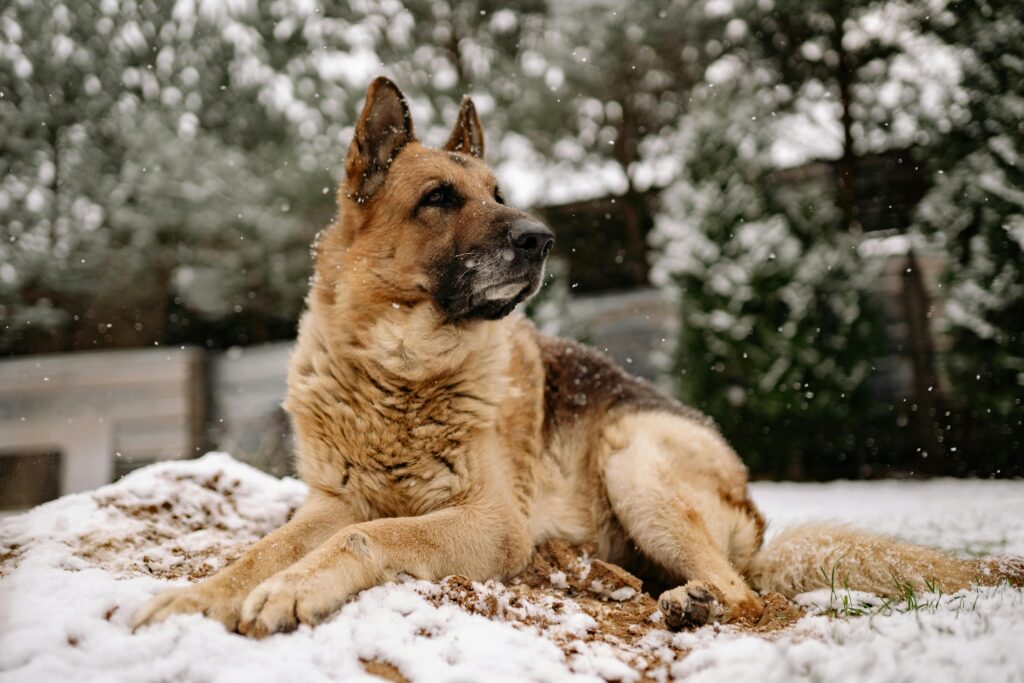German Shepherds: Personality, Training, and Care Tips

German Shepherds (GSDs) are an extraordinary breed with a reputation for intelligence, loyalty, and versatility. Whether you’re looking to bring a German Shepherd puppy home or have an adult German Shepherd dog in your life, this guide dives into everything from their history and temperament to training, health, and care essentials.
Table of contents
- Overview of the German Shepherd Breed
- The History of German Shepherds
- German Shepherd Physical Traits
- German Shepherd Temperament: What’s It Like Living with a German Shepherd?
- German Shepherds with Kids and Families
- How German Shepherds Interact with Other Pets
- Training a German Shepherd Puppy: A Step-by-Step Guide
- Advanced Training Tips for Adult German Shepherds
- Essential German Shepherd Care Tips
- Meeting Their Exercise Needs
- Common Health Concerns in German Shepherds
- Is a German Shepherd the Right Dog for You?
- FAQs
Overview of the German Shepherd Breed
German Shepherds originated in Germany as a herding and working breed. With their impressive intelligence, strength, and loyalty, they’ve found roles worldwide as police dogs, service animals, and beloved family pets.
- Size: Males typically weigh between 65-90 lbs, and females weigh between 50-70 lbs.
- Height: Males stand at 24-26 inches, while females are usually 22-24 inches.
- Coat Colors: Common colors include black and tan, sable, and bi-color, though some German Shepherds come in more unique colors like blue, liver, or all-black.
The History of German Shepherds
The German Shepherd we know today was developed by Captain Max von Stephanitz in the late 19th century. His goal was to create a highly capable herding and working dog with intelligence and trainability. These qualities remain central to modern German Shepherds, making them valuable in police work, search and rescue, and as assistance dogs.
German Shepherd Physical Traits
German Shepherds are known for their athletic build and strong features. They have a distinctive double coat that sheds year-round, with an intense shedding period in spring and fall. Their coat helps them adapt to various weather conditions, making them versatile and resilient.
- Body: Muscular with a sturdy, straight back.
- Ears: Erect and pointed, which adds to their alert expression.
- Tail: Bushy, hanging low when relaxed.
German Shepherd Temperament: What’s It Like Living with a German Shepherd?
The German Shepherd’s temperament is one of loyalty, confidence, and intelligence. They form strong bonds with their family and can be protective, making them excellent guard dogs. However, they’re also gentle with children and can be very affectionate.
- Loyalty: Known for their loyalty, German Shepherds often form close attachments to their family members.
- Intelligence: This breed is one of the most intelligent, quick to learn commands, and responds well to training.
- Energy Levels: German Shepherds have high energy levels and need plenty of physical and mental exercise.
German Shepherds with Kids and Families
German Shepherds are wonderful family dogs, known for their patience and protective instincts with children. When socialized from a young age, they often develop a gentle, watchful attitude toward kids.
- Gentle yet protective: They are generally gentle with young ones but will step in if they sense danger.
- Importance of early socialization: Early exposure to different people, pets, and situations helps them become more relaxed around family members and friends.
How German Shepherds Interact with Other Pets
German Shepherds are generally friendly with other pets, provided they are socialized early. With a strong prey drive, they may be overly curious about smaller animals. Gradual introductions and supervision are essential, especially if you’re introducing them to a household with cats or small pets.
Training a German Shepherd Puppy: A Step-by-Step Guide
Training is one of the most important aspects of raising a German Shepherd. With their intelligence and eagerness to learn, they excel in training when taught with patience and positive reinforcement.
- Start Early: Begin training and socializing your German Shepherd as soon as you bring them home.
- Consistency is Key: Stick to a daily training routine for the best results.
- Use Positive Reinforcement: Treats, praise, and playtime are effective motivators for German Shepherds.
- Basic Commands: Teach essential commands like sit, stay, come, and leave it.
- Avoid Harsh Discipline: German Shepherds respond best to a gentle approach. Harsh discipline can lead to mistrust or anxiety.
Advanced Training Tips for Adult German Shepherds
Once your German Shepherd has mastered basic commands, you can progress to advanced training techniques to challenge their intelligence and keep them mentally stimulated.
- leash Training: German Shepherds are strong, so start leash training early to ensure they walk nicely without pulling.
- Advanced Commands: Try teaching them more complex tasks or commands like retrieve, scent work, or agility exercises.
- Socialization: Continue exposing them to different people, animals, and environments to reinforce their social skills.
Essential German Shepherd Care Tips
Caring for a German Shepherd requires attention to their grooming, health, and daily exercise needs. Here are some key tips to help you keep your GSD healthy and happy.
- Grooming: Brush their coat several times a week to manage shedding, and bathe them every 6-8 weeks.
- Nail Trimming: Trim their nails regularly to prevent overgrowth and discomfort.
- Ear Cleaning: Check and clean their ears weekly to prevent infections.
- Dental Hygiene: Brush their teeth or offer dental chews to keep their teeth and gums healthy.
Meeting Their Exercise Needs
German Shepherds are active dogs with high exercise needs. Without regular activity, they can become bored and develop destructive habits. Aim for 1-2 hours of exercise daily through:
- Walks and Hikes: Walking, jogging, or hiking keeps them physically fit.
- Mental Stimulation: Engage their minds with puzzle toys, scent games, and obedience drills.
- Dog Sports: Many German Shepherds excel in agility, tracking, and herding activities.
Common Health Concerns in German Shepherds
German Shepherds are generally healthy but are prone to certain health conditions:
- Hip Dysplasia: A common issue in larger breeds that can cause joint pain.
- Degenerative Myelopathy: A progressive spinal disease affecting older GSDs.
- Bloat: A potentially life-threatening condition; feeding smaller meals can reduce the risk.

Diet and Nutrition Tips for German Shepherds
A balanced diet is crucial for German Shepherds to maintain their energy and health.
- High-Quality Protein: Look for dog foods with high meat content.
- Avoid Fillers: Foods with corn, soy, or wheat can be hard for them to digest.
- Healthy Fats: Omega-3 and Omega-6 fatty acids support their coat and skin health.
Finding Reputable German Shepherd Breeders and Rescues
If you’re considering adding a German Shepherd to your family, it’s essential to choose a reputable breeder or consider adopting from a rescue.
- Breeder Credentials: Reputable breeders will provide health clearances and information on the puppy’s lineage.
- Adoption: Many German Shepherds are available through rescues for those interested in adopting an older dog.
Is a German Shepherd the Right Dog for You?
German Shepherds make wonderful companions for the right owner. They thrive with individuals or families who can meet their high needs for exercise, mental stimulation, and training.
- Active Lifestyle: German Shepherds need regular exercise and engagement.
- Dedicated Training Time: Owners should be committed to consistent training.
- Space Requirements: A backyard or access to outdoor areas is ideal.
If you’re still unsure, Dog Breed Info Center offers quizzes to help you decide.
Final Thoughts on Owning a German Shepherd
Owning a German Shepherd is an incredible journey filled with challenges and rewards. With their loyalty, intelligence, and protective nature, they make fantastic companions. By investing time in training, socialization, and care, you’ll build a strong bond with your German Shepherd that lasts a lifetime.
Whether you’re a first-time dog owner or a seasoned canine enthusiast, this remarkable breed will always keep you on your toes and fill your life with love.
Remember, every dog is an individual, and while this guide provides general information, it’s important to adapt your approach based on your German Shepherd’s unique personality and needs.
Resources for German Shepherd Owners
Here are some valuable websites and resources for German Shepherd owners:
- American Kennel Club (AKC): Offers breed information, training tips, and events.
- German Shepherd Dog Club of America: A great resource for breed standards and responsible breeding.
- The Dog Training Club: Provides online training courses and resources.
- Petfinder: A fantastic resource for finding German Shepherd rescues and adoptable dogs.
FAQs
1. What is the average lifespan of a German Shepherd? Typically, German Shepherds live between 10 and 13 years. However, proper care, a healthy diet, and regular veterinary check-ups can significantly extend their lifespan.
2. Are German Shepherds good with children? While German Shepherds can be excellent family dogs, early socialization and training are crucial. It’s important to supervise interactions between children and dogs, especially young children.
3. How much exercise does a German Shepherd need? German Shepherds are highly energetic dogs that require daily exercise to stay healthy and happy. Aim for at least an hour of physical activity, including walks, runs, or playtime in a fenced-in yard.
4. What are some common health problems in German Shepherds? Some common health issues in German Shepherds include hip and elbow dysplasia, bloat, and various eye conditions. Regular veterinary check-ups can help identify and manage these conditions.
5. What is the best diet for a German Shepherd? A high-quality dog food that is appropriate for their age and activity level is essential. Consult with your veterinarian to determine the best diet for your specific German Shepherd.
6. How often should I groom my German Shepherd? Regular grooming is important to maintain your German Shepherd’s coat and overall health. Brush their coat at least twice a week to remove loose hair and prevent matting.
7. How do I train a German Shepherd? Positive reinforcement training methods, such as reward-based training, are most effective for German Shepherds. Consistency, patience, and positive reinforcement are key to successful training.
8. Are German Shepherds good guard dogs? Yes, German Shepherds are known for their protective instincts and can make excellent guard dogs. However, it’s important to train them properly and socialize them with people and other animals.
9. Can German Shepherds live in apartments? While German Shepherds can adapt to apartment living, they require plenty of exercise and mental stimulation. Regular walks, playtime, and training sessions are essential.
10. How do I choose a reputable German Shepherd breeder? When choosing a breeder, look for one who prioritizes the health and well-being of their dogs. Ask to see health clearances for both parents, and visit the breeder’s facility to observe the living conditions of the puppies and adult dogs.








